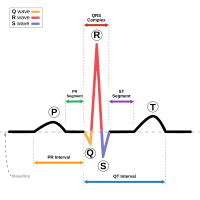
Photo from wikipedia
Abstract Funding Acknowledgements Type of funding sources: None. Introduction Off-label use of drugs with potential for QT interval prolongation was common in COVID-19 patients. We tested a portable EKG recording… Click to show full abstract
Abstract Funding Acknowledgements Type of funding sources: None. Introduction Off-label use of drugs with potential for QT interval prolongation was common in COVID-19 patients. We tested a portable EKG recording device to measure and monitor corrected QT (QTc) intervals in a cohort of COVID-19 patients treated with azithromycin, hydroxychloroquine, lopinavir/ritonavir, or combinations of these drugs. Methods and results Sixty-nine patients hospitalized with pneumonia and confirmed SARS-CoV 2 infection were included in an observational single-centre study. Six-lead EKG recordings were obtained using a KardiaMobile6L® at physicians’ discretion. In a subgroup of 16 patients with early discharge, a device was provided for at-home daily monitoring. Significant QTc interval prolongation was observed in patients taking a combination of 2 or 3 drugs (426 ± 33 vs 408 ± 33 ms, p = 0,002; and 435 ± 30 vs 394 ± 31 ms, p = 0,001, respectively). The use of the device prompted a change in the treatment of 9 patients (13%) because of prolongation of QTc interval and anticoagulation was started in one patient because of atrial fibrillation diagnosis. In the subgroup of patients with daily recording, QTc interval prolongation peaked at day 2 ± 1,8, with a shorter final QT interval than that recorded before drug initiation (350,0 ± 31,4 vs 381,0 ± 21,2; p = 0,019), pointing to a possible role of the disease itself in QT interval modification. To assess the consistency of measurements of QTc interval, a random sample of 120 EKG recordings were analyzed by two different physicians. Inter-operator intraclass correlation coefficient was 0,702, 95% CI (0,578-0,789). Conclusions Portable EKG-recording device was useful for QTc interval monitoring in COVID-19 patients receiving drugs with QTc prolonging potential, allowing physicians to adapt management. Significant QT prolongation was observed in these patients. Characteristics of the three groups. Group 1(one drug)N= 9 (13,0%) Group 2(two drugs)N= 37 (53,6%) Group 3(three drugs)N= 23 (33,3%) p-value Clinical characteristics Age (years) 55,0 ± 18,3 66,0 ± 16,2 58,0 ± 15,8 p = 0,248 Male sex (%) 6 (66,7%) 25 (67,6%) 18 (78,3%) p = 0,643 Dislipidaemia (%) 5 (55,6%) 9 (24,3%) 7 (30,4%) p = 0,749 Diabetes (%) 7 (77,8%) 4 (10,8%) 5 (21,7%) p = 0,525 Hypertension (%) 3 (33,3%) 16 (43,2%) 8 (34,8%) p = 0,387 Previous cardiopathy (%) 6 (66,7%) 11 (29,7%) 3 (13,0%) p = 0,305 COPD (%) 7 (77,8%) 6 (16,2%) 1 (8,7%) p = 0,679 COPDchronic obstructive pulmonary disease. Abstract Figure. Baseline and maximum QTc intervals
Journal Title: Europace
Year Published: 2021
Link to full text (if available)
Share on Social Media: Sign Up to like & get
recommendations!